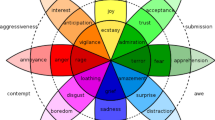Abstract
To comprehend human behavior can be a very difficult task for children with Autism Spectrum Disorder (ASD). These children have difficulties in social interaction, and they manifest repetitive patterns. Furthermore, they present deficits in imitation which can be directly linked to impairments in social interaction skills. Taking this into account, this paper presents the serious game HiZeca, in which a virtual agent (ZECA Avatar) is able to interact with a child, in order to promote social interaction and training certain facial movements that will be validated, and that will facilitate imitation and recognition of emotions (content, sad, surprised, among others). In order to validate the system, tests were conducted with typically develo** children and children with ASD. The results show that, in general, the game was accepted with a positive feedback from the children.
Access this chapter
Tax calculation will be finalised at checkout
Purchases are for personal use only
Similar content being viewed by others
References
Piaget: Piaget and His School. Springer, Heidelberg (1976). https://doi.org/10.1007/978-3-642-46323-5
Ingersoll, B.: The social role of imitation in autism. Infants Young Child. 21(2), 107–119 (2008)
Silva, V., Soares, F., Sena Esteves, J.: Mirroring emotion system – on-line synthesizing facial expressions on a robot face. In: 8th International Congress on Ultra Modern Telecommunications and Control Systems and Workshops (ICUMT), Lisbon, Portugal, 18–20 October 2016
LuxAI, QTrobot - LuxAI.com. http://luxai.com/qtrobot/. Accessed 6 Dec 2018
Tobii Dynavox logo, Sono Flex for Communicator 5 - Tobii Dynavox. https://www.tobiidynavox.com/software/content/sono-flex-for-communicator-5/. Accessed 7 Dec 2018
Livox, Livox: para pessoas com deficiências e transtornos de aprendizagem. http://www.livox.com.br/pt/quem-somos/#sobre. Accessed 6 Dec 2018 (in Portuguese)
TippyTalk - Comunicação Instantânea para Pessoas Não Verbais. (n.d.). http://www.tippy-talk.com/. Accessed 16 Jan 2019. (in Portuguese)
Ferreira, V.: Utilização das tecnologias em crianças com perturbações do espectro autista em contexto da Prática de Ensino Supervisionada. Universidade Católica Portuguesa, Centro Regional de Braga, Faculdade de Ciências Sociais, Braga (2013).(in Portuguese)
Santos, P., Silva, V., Soares, F., Simões, A.: Facial virtual tracking: a system to mirror emotions. In: Moura Oliveira, P., Novais, P., Reis, L.P. (eds.) EPIA 2019. LNCS (LNAI), vol. 11805, pp. 68–79. Springer, Cham (2019). https://doi.org/10.1007/978-3-030-30244-3_7
McLeod, S.: Bandura - Social Learning Theory (2016)
Moura, M.L., Ribas, A.: Imitação e desenvolvimento inicial: evidências empíricas, explicações e implicações teóricas. Estudos de Psicologia (2002). (in Portuguese)
Acknowledgments
This work has been supported by FCT – Fundação para a Ciência e Tecnologia within the R&D Units Project Scope: UIDB/00319/2020. Vinicius Silva also thanks FCT for the PhD scholarship SFRH/BD/ SFRH/BD/133314/2017.
Author information
Authors and Affiliations
Corresponding author
Editor information
Editors and Affiliations
Rights and permissions
Copyright information
© 2022 The Author(s), under exclusive license to Springer Nature Switzerland AG
About this paper
Cite this paper
Santos, P., Silva, V., Sena Esteves, J., Pereira, A.P., Soares, F. (2022). HiZeca: A Serious Game for Emotions Recognition. In: Machado, J., Soares, F., Trojanowska, J., Yildirim, S. (eds) Innovations in Mechatronics Engineering. icieng 2021. Lecture Notes in Mechanical Engineering. Springer, Cham. https://doi.org/10.1007/978-3-030-79168-1_35
Download citation
DOI: https://doi.org/10.1007/978-3-030-79168-1_35
Published:
Publisher Name: Springer, Cham
Print ISBN: 978-3-030-79167-4
Online ISBN: 978-3-030-79168-1
eBook Packages: Intelligent Technologies and RoboticsIntelligent Technologies and Robotics (R0)




